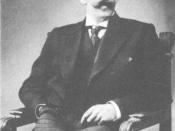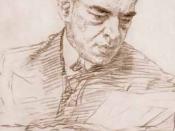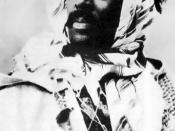According to Peter Brook, 'no-one, since Stanislavski, has investigated the nature of acting, its phenomenon, its meaning, the nature and science of its mental-physical-emotional processes as deeply and completely as Grotowsi.'
Grotowski was highly devoted to Stanislavski's work, so much so that as a young student in the State Theatre Institute in Poland he made independent research into the work of Stanislavski where he learned to work with physical actions. In his essay, 'Risposta a Stanislavskij' (Answer to Stanislavski), Grotowski states:
'When I was a student in the school of dramatic art, in the faculty for actors, I founded the entire base of my theatrical knowledge on the principles of Stanislavski. As an actor, I was possessed my Stanislavski. I was a fanatic. I retained that it was the key that opens all the doors of creativity. I worked a lot to arrive to know all possible about that which he said or what was said about him.'
However Grotowski did not just copy Stanislavski's work and research, but rather continued where he left off. Stanislavski's work on physical actions stopped only because he died, and Grotowski decided to continue the investigation on the knowledge already founded by Stanislavski. Grotowski says, 'I continued his research and did not just repeat what he had already discovered.'
Jerzy Grotowski and Konstantin Stanislavski both dedicated their lives to research on craft. They worked with extraordinary stamina and persistence of personal effort, arriving at great achievements and discoveries in their art. An important question for both theatre makers was, 'For what does one work?' ' To serve' is imperative and foremost in their way of approaching art and the creative act. They both worked constantly, and through their efforts attempted to serve something over themselves. Such persons often arrive at great discoveries, and...



Please don't plagiarise anymore
I found that you had stolen your submitted essay on technology so I don't know if this is copied as well, especially as it has footnote numbers but no corresponding footnotes themselves.
4 out of 5 people found this comment useful.